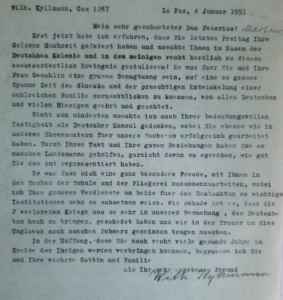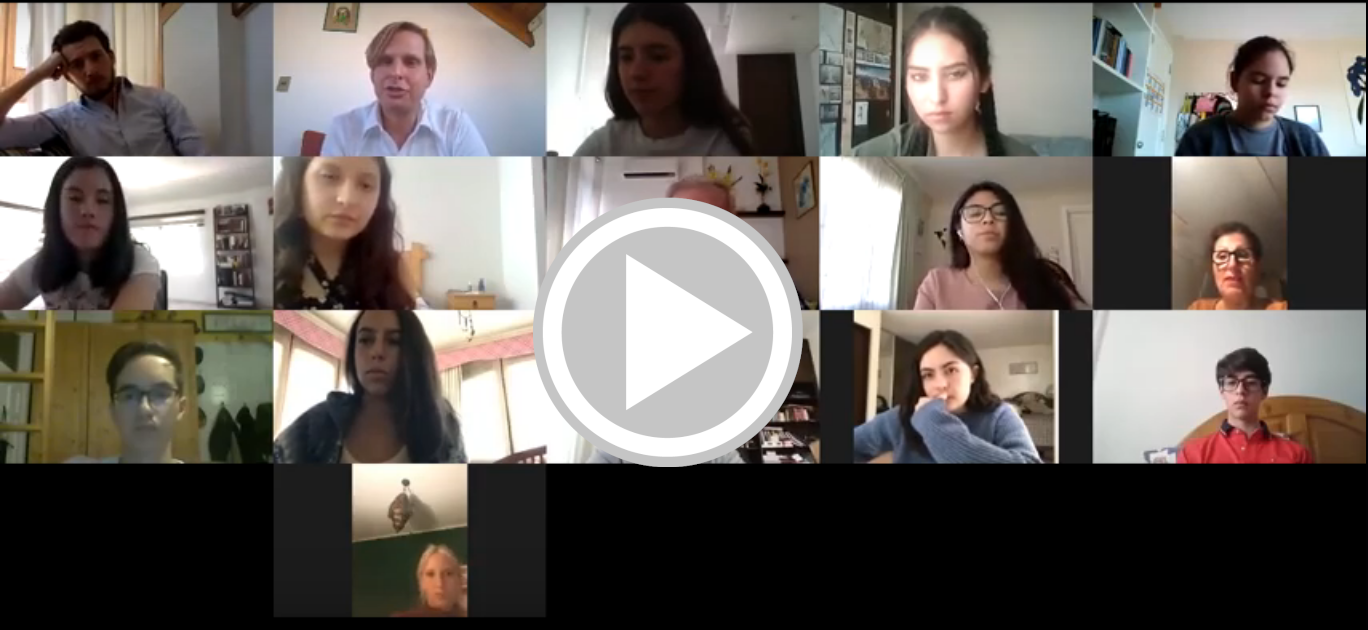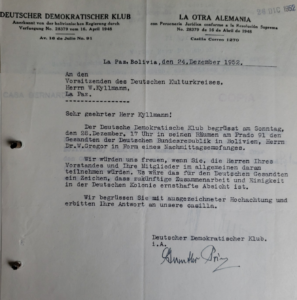.
National (social) ism in the German Cultural Community of La Paz
by Anne Vargas and Renata Salas
How strongly were National Socialist tendencies represented in the German community in Bolivia? We asked this question in the context of the “Remembrance Project” to Mr Bernd Stahmer.
The fact that the German Cultural Community and also the German School were ideologically influenced is shown by the pictures from that time, which we show in extracts on this homepage. And a private letter from the former chairman of the German Cultural Community also shows that Bolivians of German origin were at least German-nationally minded and they regretted that the two world wars had done such damage to the German reputation and “Germanism”.
Bernd Stahmer has been living in Bolivia since the beginning of the 1960s and was the brother-in-law of Monika Ertl. Her father – and Mr. Stahmer’s father-in-law – was Hans Ertl, Leni Riefenstahl’s cameraman, who came to Bolivia because his work in post-war Germany had been made more difficult due to his involvement in Nazi propaganda films.
(https://de.wikipedia.org/wiki/Hans_Ertl_(Bergsteiger)). His daughter, Monika Ertl, on the other hand, belonged to the radical left-wing group “Ejército de Liberación Nacionala” round Che Guevara and was suspected of having killed the Bolivian consul in Hamburg who had been involved in the murder of Che Guevara (https://de.wikipedia.org/wiki/Monika_Ertl or https://www.spiegel.de/geschichte/leben-und-sterben-der-monika-ertl-a-948245.html). Mr Stahmer was unable to say whether there was a connection between Hans Ertl’s past and the radicalisation of his daughter, as little was said about politics in the private sphere.
During the interview Mr. Stahmer told us about his experiences and his impressions of the adaptation of the German community in Bolivia.
Born in Hamburg, Mr. Stahmer came to Bolivia, attracted by the business opportunities there. In contrast to most Jews who had to flee and immigrate only out of a desire for security, the Germans who came to Bolivia after 1945 were looking for new opportunities, new beginnings and new possibilities. As a result, as is well known, many German families founded large companies in the country.
For him, the adjustment phase was easy, as the German community was already well established in Bolivia and German newcomers were quickly and well-integrated.
A completely different, negative example for the good reception of Germans in Bolivia is the already mentioned, notorious Klaus Barbie alias Altmann, who managed to continue his criminal life in this country unhindered: As a government advisor he was able to pass on his experiences, including the search and murder of Che Guevara. He was later extradited to France in 1983 for his war crimes as an SS officer in Lyon, which earned him the nickname “Butcher of Lyon”, where he spent his last days in prison. To what extent the German community was informed about Klaus Barbie’s past at the beginning cannot be said with absolute certainty. It can be assumed, however, that most of them knew about Klaus Barbie’s true identity quite quickly and covered up for him. Only when he started singing Nazi songs after a long evening at the Club Alemán did people distance themselves from him and excluded him from the German Cultural Community.
The integration differed, of course, depending on the person, time and group. As mentioned above, the Jews were not interested in integration into the “Reichsdeutsche Gemeinschaft”, as the German Cultural Community called itself during the Nazi period, and they did not want to send their children to the Nazi-influenced school, so that by the 1980s the Jewish-German community had developed independently of the old-established German community and, at the same time, the “German Democratic Club – The Other Germany” was founded, which until the 1950s was still in conflict with the CCA (Centro Cultural Alemán), the German Cultural Community, as an exchange of letters on the occasion of the appointment of the new German ambassador shows. It can thus be said that until the 1960s and 1970s there were three competing “German groups”.
In La Paz, this led to the foundation of an Israelite school alongside the German School, mainly by German-Jewish migrants. Mr. Stahmer commented that in his view there had been no competition between the two educational units and that the German School, at least since the end of the war, had adopted a politically neutral position. However, Guillermo Wiener, an Austrian Jew and pupil of the Israelite school, emphasised in his biography “Recuerdos de un Judio boliviano” how important it was to him to have won against the “Colegio Alemán” in the mathematics competition of the schools in La Paz.
Mr. Stahmer explains the demarcation of the Jewish community against the German community with the past war events, which had left traces in world history, but which had gradually diminished, so that in later times Jews also became members of the CCA, such as one of the former treasurers, and they sent their children to the German School again.
It was the German community that welcomed Bernd Stahmer with open arms and where he had the opportunity to meet his future (also German) wife Beatrix Ertl. Years later he was able to meet Hans Ertl, his father-in-law, in the Chiquitania. Mr Stahmer describes Mr Ertl as an amateur mountaineer. He undertook several expeditions to the Andes, like the one to the Illimani near La Paz, or to the Amazon. He also enjoyed making films, a passion with which he worked in his youth for the well-known National Socialist propagandist Leni Riefenstahl. According to Mr Stahmer, Hans Ertl was rather apolitical. He had worked for the NS propaganda because he loved filming, not the ideology or the propaganda.
Finally, Mr. Stahmer expressed his opinion about the good relations between Bolivia and Germany at all times and emphasised their mutual support and the great value that the German School had and still has for the German community, but also for Bolivia as a whole.






